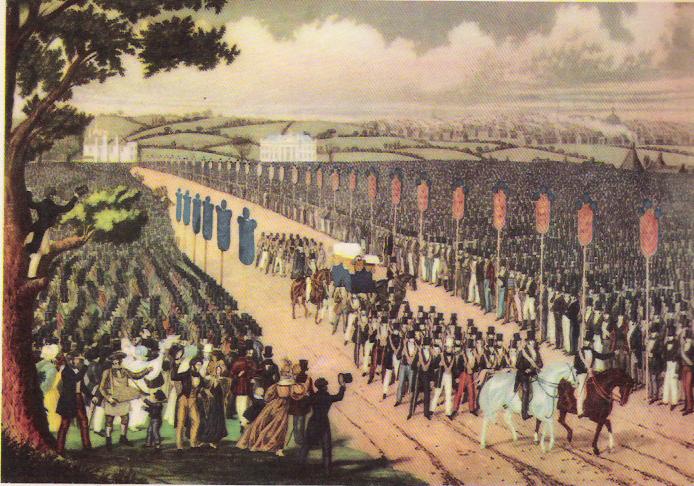Roots of Democracy - Democrat July-August 2008
Tolpuddle Martyrs
Between 1770 and 1830, illegal enclosures of common land changed the English rural landscape. In 1798 the French Revolution resulted in the aristocracy being removed as the ruling class. This made the establishment in England very aware of any unrest. The initial phase of the industrial revolution was underway.
Landowners enclosed and annexed vast acreages of land, producing even greater wealth from the now familiar pattern of small hedged fields. The peasants were left without plots to grow vegetables and they lost open commons for grazing their sheep and pigs and even a single cow. They had to sell their labour to the enriched landowners.
Diet was basic - tea, bread and potatoes. As a result, the working people were badly nourished and small.
By 1840 wages of farm labourers were from 9 to 10 shillings a week and expenditure on rent, food, candles and coal was over 13 shillings. Income had to be supplemented by wives and children working.
Two bad harvests and winters in 1829 and 1830 generated resentment which resulted in riots allegedly lead by the mythical Captain Swing. The authorities took a heavy hand against these protests with 600 rioters imprisoned, 500 sentenced to transportation, and 19 executed.
In 1832 in the village of Tolpuddle, Dorset, several farm labourers got together and formed a union, the Friendly Society of Agricultural Labourers, to give them strength through collective bargaining. They were led by George Loveless and refused to work for less than 10 shillings a week as by this time wages had been lowered to seven shillings. They were directly opposed by local landowner James Frampton who liaised with the Prime Minister.
The government supported the landowning class who dominated parliament and were intent on stamping dissent and squashing trade unions. The landed class and aristocrats did not want their power base and wealth taken away and most of all they did not want a revolution in England. In 1832 the Reform act extended the vote in England but did not provide universal suffrage.
Frampton was an ardent supporter of the established church, laws written in favour of his class and the monarchy. He set about framing the labourers’ union on a trumped up charge meant for the Navy and nothing to do with the rights of workers. The charge was based on the 1797 Mutiny Act related to marines and seamen at the Nore. The labourers in forming the union of taking an unlawful oath as in 1824 organising to gain better working conditions were made illegal when the Combination Acts were repealed.

Loveless and five others were arrested, put on trial, found guilty and transported to Australia for a seven year sentence. There was popular support for the men and widespread opposition to the gross injustice meted out. The result of the national campaign culminated in the release of five of them in 1836, James Brine, George Loveless and his brother James Loveless, Thomas Standfield and son John Standfield, and the last James Hammett in 1837.
Demonstration in Copenhagen Fields in solidarity with the Tolpuddle Martyrs in 1834
The Tolpuddle Martyrs are remembered each year in July in the place they made a stand for better wages and conditions.
The Conservative Thatcher Government put in place anti-trade union legislation which makes illegal secondary action in support of other workers and notice of ballots and strikes. On top of that the European Court of Justice has ruled against collective bargaining on two occasions.
All this legislation is to remove the democratic rights of workers and their trade unions and is no different to that faced by the Tolpuddle Martyrs. The difference is the form it takes in a combination of oppressive national legislation overlaid by EU legislation put in place on behalf of the transnationals, privateers and big capital.
Defending and re-establishing the democratic rights has to be a combination of opposing both national and EU anti-trade union legislation which will not be done by cosy chats!
The example of the Martyrs must be remembered and acted upon.
Roots of Our Rights I and II contain a series in similar vein of historical pieces in pamphlet form and now available for £2.40 the pair post free.